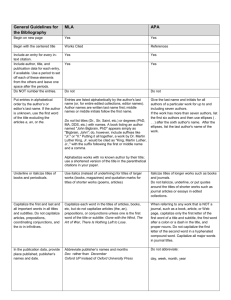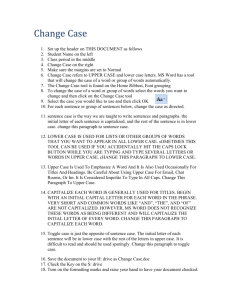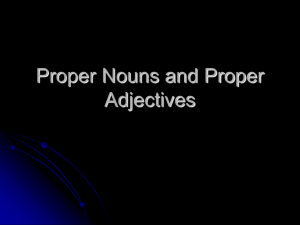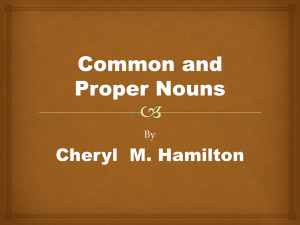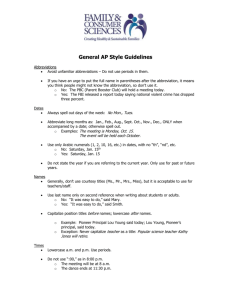Style guidelines - Visegrad Insight
advertisement
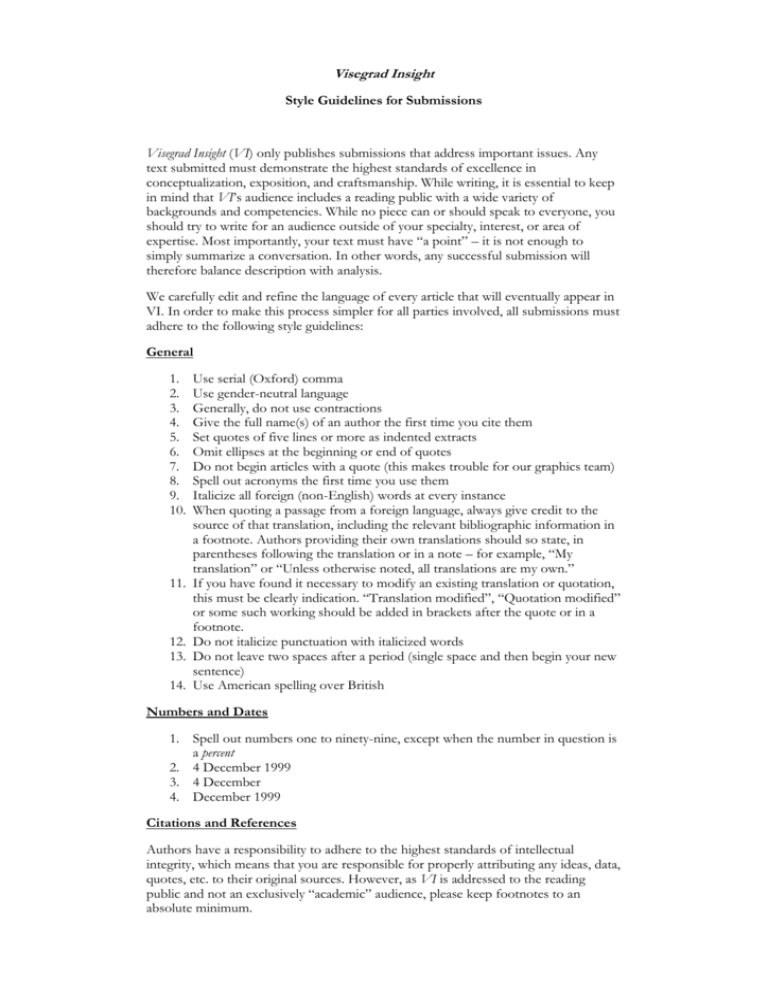
Visegrad Insight Style Guidelines for Submissions Visegrad Insight (VI) only publishes submissions that address important issues. Any text submitted must demonstrate the highest standards of excellence in conceptualization, exposition, and craftsmanship. While writing, it is essential to keep in mind that VI’s audience includes a reading public with a wide variety of backgrounds and competencies. While no piece can or should speak to everyone, you should try to write for an audience outside of your specialty, interest, or area of expertise. Most importantly, your text must have “a point” – it is not enough to simply summarize a conversation. In other words, any successful submission will therefore balance description with analysis. We carefully edit and refine the language of every article that will eventually appear in VI. In order to make this process simpler for all parties involved, all submissions must adhere to the following style guidelines: General 1. 2. 3. 4. 5. 6. 7. 8. 9. 10. 11. 12. 13. 14. Use serial (Oxford) comma Use gender-neutral language Generally, do not use contractions Give the full name(s) of an author the first time you cite them Set quotes of five lines or more as indented extracts Omit ellipses at the beginning or end of quotes Do not begin articles with a quote (this makes trouble for our graphics team) Spell out acronyms the first time you use them Italicize all foreign (non-English) words at every instance When quoting a passage from a foreign language, always give credit to the source of that translation, including the relevant bibliographic information in a footnote. Authors providing their own translations should so state, in parentheses following the translation or in a note – for example, “My translation” or “Unless otherwise noted, all translations are my own.” If you have found it necessary to modify an existing translation or quotation, this must be clearly indication. “Translation modified”, “Quotation modified” or some such working should be added in brackets after the quote or in a footnote. Do not italicize punctuation with italicized words Do not leave two spaces after a period (single space and then begin your new sentence) Use American spelling over British Numbers and Dates 1. Spell out numbers one to ninety-nine, except when the number in question is a percent 2. 4 December 1999 3. 4 December 4. December 1999 Citations and References Authors have a responsibility to adhere to the highest standards of intellectual integrity, which means that you are responsible for properly attributing any ideas, data, quotes, etc. to their original sources. However, as VI is addressed to the reading public and not an exclusively “academic” audience, please keep footnotes to an absolute minimum. 1. Use footnotes to provide citations or to raise fine points outside of the body of the article 2. Always cite page numbers of the text you are quoting 3. Use ed. or eds. for “editor (s)” 4. Italicize the titles of all journals, books and films 5. Place the titles of articles in quotes Your citations should include the following material: 1. Author: full name of author or authors; full name of editor or editors, and if no author is listed, please provide the name of the institution responsible for the document in question 2. Title: full title of the book, article, or column including subtitle 3. Editor, compiler, or translator, if any 4. Edition, if not the first 5. Volume, if it is a multi-volume work 6. Facts of publication: city, publisher, date, volume, issue number, etc. 7. Page number or numbers if applicable 8. A URL for Internet sources or, for other electronic sources, an indication of the medium consulted Example for the citation of a book: Salman Rushdie, The Ground beneath Her Feet (New York: Henry Holt, 1999). Kurt Johnson and Steve Coates, Nabokov’s Blues: The Scientific Odyssey of a Literary Genius (Cambridge, MA: Zoland Books, 1999). Paul Schellinger, Christopher Hudson, and Marijk Rijsberman, eds. Encyclopedia of the Novel (Chicago, IL: Fitzroy Dearborn, 1998). Theodor Adorno and Walter Benjamin, The Complete Correspondence, 1928-1940, ed. Henri Lonitz, trans. Nicholas Walter (Cambridge, MA: Harvard University Press, 1999): 56-94. Example for citation of journal article: Judith Lewis, “Tis a Misfortune to Be a Great Ladie: Maternal Mortality in the British Aristocracy, 1558-1959,” Journal of British Studies 37 (1998): 26-53. Michel Garaud, “Recherches sur les defrichements dans la Gatine politevine aux XIe et XIIe siècles,” Bulletin de la Societe des antiquaries de l’Ouest, 4th ser., 9 (1967): 11-27. Example for citation of newspaper article: Mike Royko, “Next Time, Dan, Take Aim at Arnold,” Chicago Tribune, September 23, 1992. Editorial, Philadelphia Inquirer, July 30, 1990. Example of citation of source from the Internet: Reuters, “Russian Blasts Kill 21,” Yahoo! News, March 24, 2001, http://dailynews.yahoo.com/. Example of citation of film: North by Northwest, directed by Alfred Hitchcock (Burbank, CA: Metro-GoldwinMayer, 1959). Example of citation of scene in a film on DVD (Generally films and video recordings are treated like books, with scenes being treated as chapters and cited by title or number): “Crop Duster Attack,” North by Northwest, DVD, directed by Alfred Hitchcock (1959; Burbank, CA: Warner Home Video, 2000). Capitalization Rules: 1. Capitalize the first word of a quoted sentence. 2. Capitalize proper nouns 3. Capitalize a person’s title when it precedes the name. Do not capitalize when the title is simply used as a description following the name 4. Capitalize the titles of high-ranking government officials when it precedes their name. Do not capitalize such titles when it is used instead of a name. 5. Capitalize cardinal directions only when they refer to specific regions. (“Northern Hungary”, “the northern part of town”) 6. Always capitalize the first and last words of titles of publications. In titles, do capitalize nouns, pronouns, adjectives, verbs, adverbs, and subordinate conjunctions, but do not capitalize all articles, coordinate conjunctions and prepositions regardless of length, when they are other than the first or last word, and do not capitalize “to” in an infinitive. 7. Capitalize “federal”, “state” or words such as “department” “bureau” and “office” when used as part of official titles, but not when they are used as general terms. 8. Do not capitalize the names of seasons 9. Capitalize the days of the week, months and holidays 10. Capitalize the names of G-d, specific deities, religious figures and holy books, but not the non-specific use of the word g-d 11. Capitalize the names of countries, nationalities and specific languages 12. Capitalize major periods and events, but not century numbers (“Great Depression”, “sixteenth century”) 13. Capitalize Trademarks 14. Words and abbreviations of specific names (“Freudian”, the “UN”) Author Bio’s should adhere to the following construction and always be in the third person: Eliot Caliban is an adjunct lecturer in philosophy at the University of Warsaw and Polish Academy of Sciences. His research is primarily focused on 20th century Jewish philosophy and the political theology of Shakespeare. Polyanna Wojtkowska is a photographer based in Warsaw and Madrid. Her work has generally focused on the lives of Polish migrant workers in Spain. For issues not addressed in this sheet, please consult the Chicago Manual of Style, 15th edition or later.
